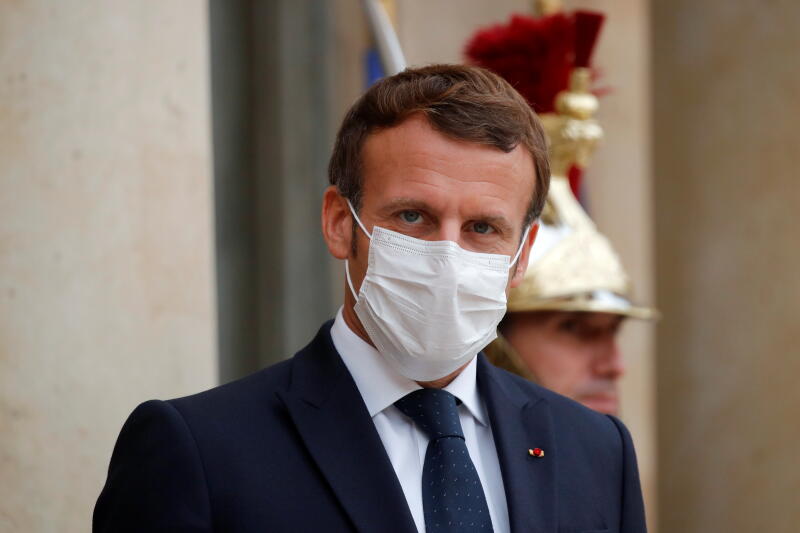Battling two crises, France's Macron faces defining moment
Sign up now: Get ST's newsletters delivered to your inbox

President Emmanuel Macron has been beset by a succession of crises.
PHOTO: REUTERS
PARIS (AFP) - Simultaneously battling the twin crises of the second wave of the coronavirus pandemic and a resurgence in Islamist attacks, French President Emmanuel Macron faces a defining moment that will determine the success of his presidency and even his chances of re-election.
Mr Macron came to power in 2017 on a wave of optimism that he was a transformational leader who would bring much-needed reform to France and restore its confidence as a player on the global stage.
But for two years he has been beset by a succession of crises, first, from 2018 to 2019, more than a year of "yellow vest" protests against his reforms, and then a crippling nation-wide strike last winter over changes to France's pension system.
And just when the strikes dwindled and Mr Macron began talking confidently about what was to come in the "second act" of his mandate, the world was hit by the coronavirus pandemic, which forced a nation-wide lockdown.
As France was beginning to recover from the economic hit of that lockdown, the virus surged again, forcing Mr Macron to announce a fresh lockdown last week.
The country is now in shock after the beheading of a teacher and the killing of three people in a church, attacks that have been blamed on Islamist radicals and which have propelled the fight against terror to the top of the agenda. The motives behind the shooting of a priest in Lyon on Saturday (Oct 31) are still not clear.
The current period is the toughest for Mr Macron since he came to power, said Mr Bruno Cautres, political researcher for the Paris-based Centre for Political Research at Sciences Po (CEVIPOF).
When confronted with the "yellow vest" protests, the French leader had the "political capacity" to respond to the demands and came up with a package worth €10 billion, he noted.
"This permanent pressure is offering us no respite," admitted an advisor of Mr Macron's administration, who asked not to be named.
"We have lost the control of the agenda."
No one can blame Mr Macron for the emergence of the pandemic but the government is under pressure from critics who accuse it of having failed to prepare for the second wave.
"The virus is circulating in France with a speed that even the most pessimistic forecasts did not anticipate," the French leader said in an address to the nation announcing the new lockdown, prompting an outcry from medics who had indeed warned of such a scenario.
And while France is united in its outrage over the deadly attacks, there are questions over why security services failed to watch the assailants, and a debate over whether his strategy against Islamist radicalism is too hard or too soft.
For almost two years Mr Macron has been unable to impose his own agenda in the face of fast-changing events, said Mr Cautres.
"The French have the impression of going through a succession of crises that never go away."
As France enjoyed a relatively normal summer, unaware of the ferocity of the coronavirus wave that was to follow, Mr Macron hoped to regain the initiative with a €100 billion relaunch plan and a strategy of "living with the virus".
Since then, however, attempts to move forward on an ambitious agenda of green policies, economic change, and the overhaul of France's pension system have been stymied by external factors.
This is a particular concern for a president who has never enjoyed wild popularity - with the latest Ifop survey giving him a 38 per cent approval rating - and whose party flopped in local polls earlier this year.
Eyes are already focused on the 2022 presidential election where Mr Macron's most likely challenger will be far-right leader Marine Le Pen. He hopes to avoid the same one-term fate as predecessors Nicolas Sarkozy and Francois Hollande.
But if he wants to emerge victorious, the French leader needs to "finally get results", said prominent political commentator Philippe Moreau-Chevrolet.
"If the health situation does not improve by the end of the year or the beginning of 2021, it will be truly very difficult for him. He will be held directly responsible. At this anxiety-inducing moment, Emmanuel Macron probably has the worst job in the world."
But political analyst Pascal Perrineau said that even if a majority of French was "not convinced by the president and the majority then they are even less so by the opposition".


